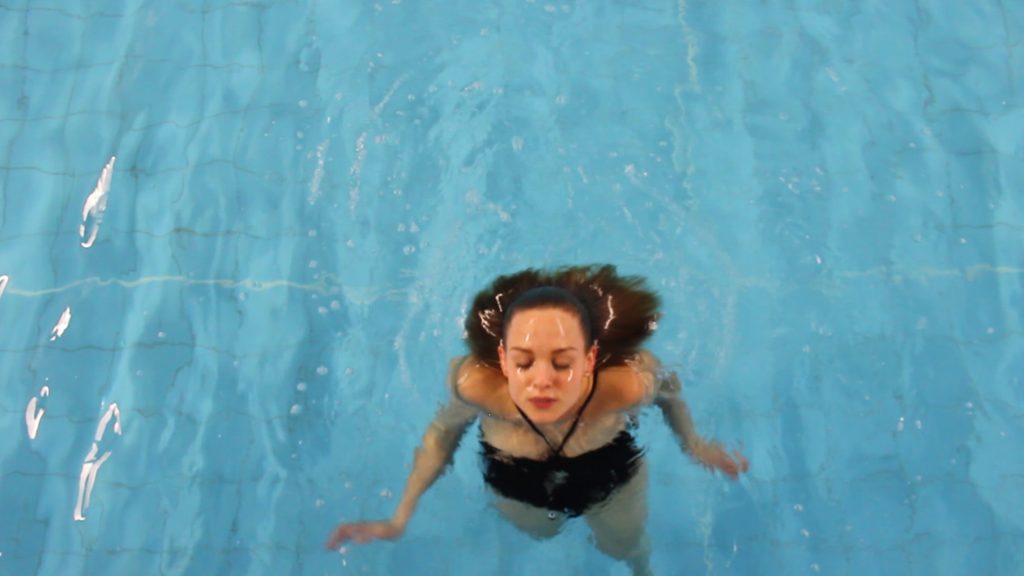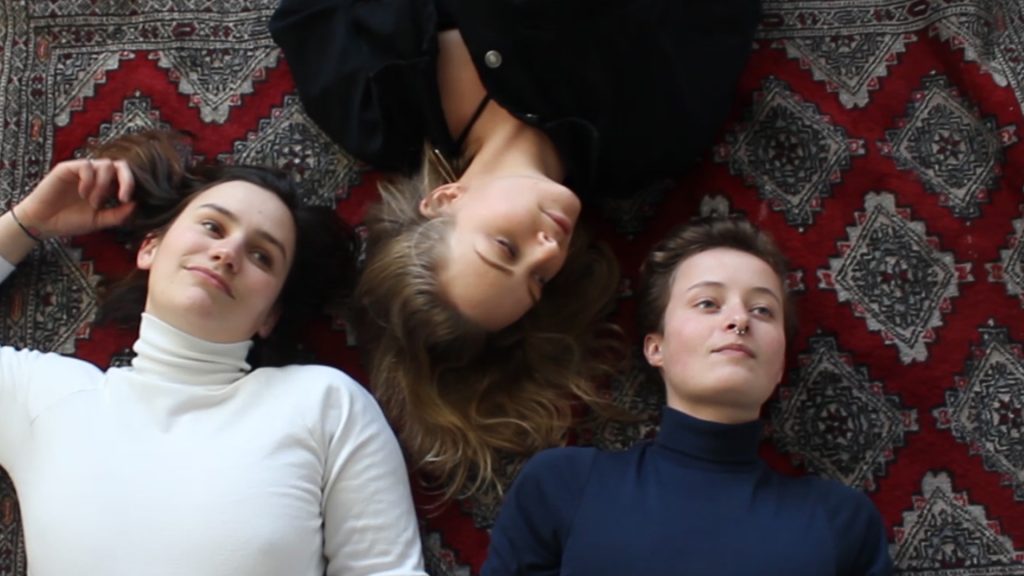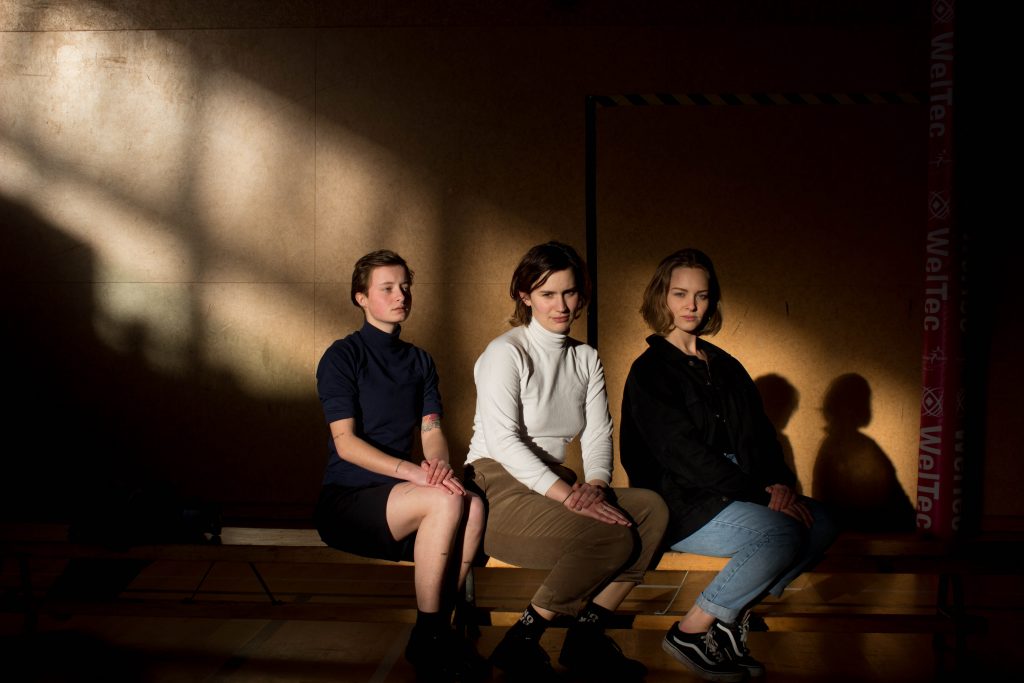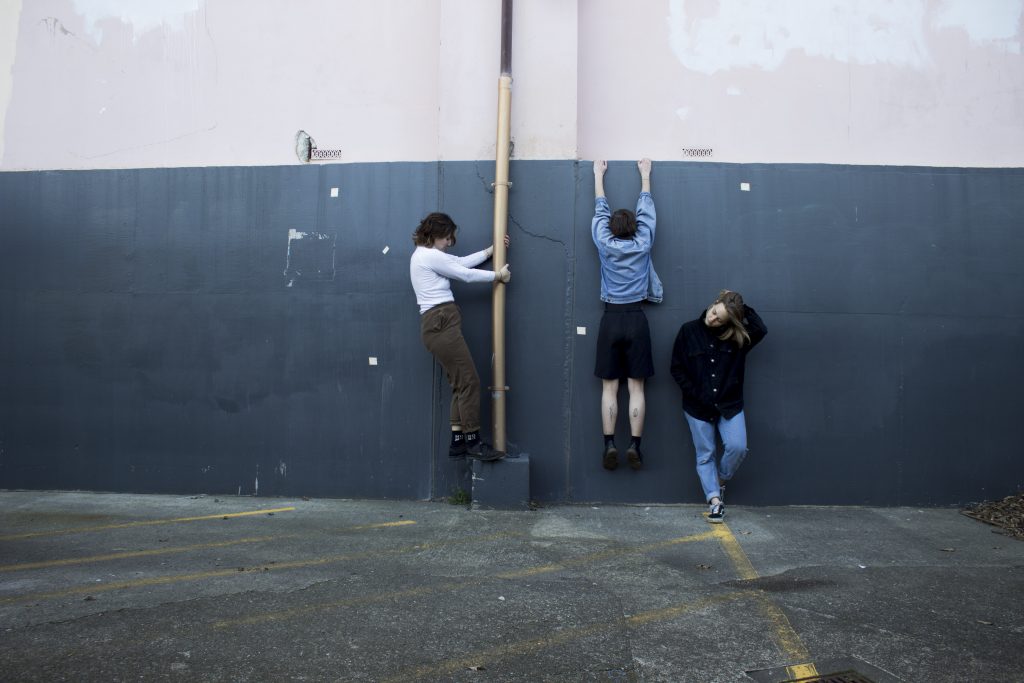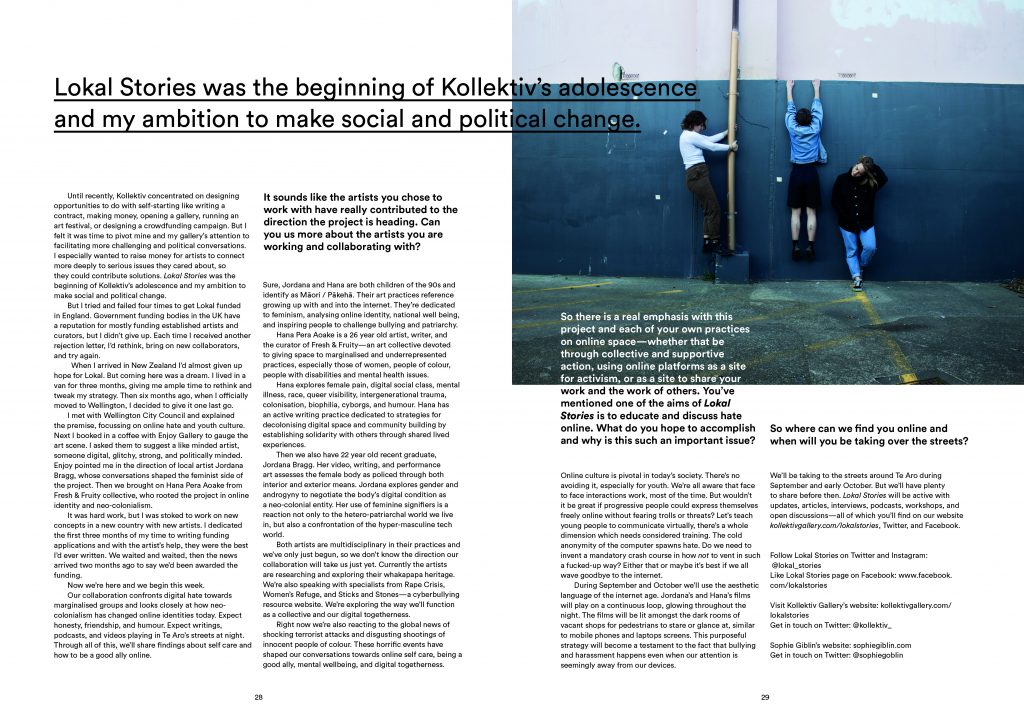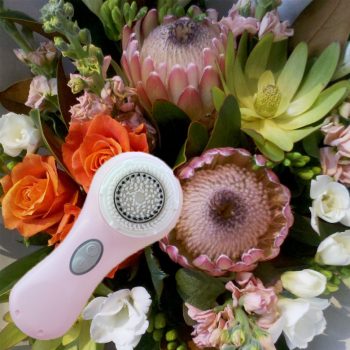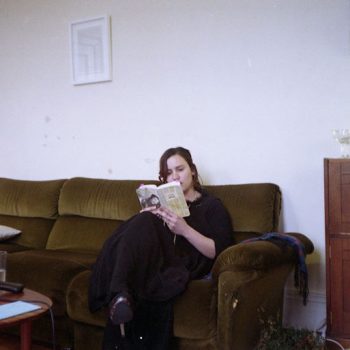Sophie Giblin is an artist, feminist, educator, and founder of Kollektiv Gallery in the UK. She spoke with the Salient editors about Kollektiv’s latest project, Lokal Stories, which explores the hate towards marginalised groups online. The project is in collaboration with Pōneke/Wellington artists Jordana Bragg and Hana Pera Aoake from Fresh and Fruity.
Photography by Laura Duffy, courtesy of Kollektiv Gallery & Lokal Stories.
Salient Art Editors: You recently moved to Wellington / New Zealand from the UK. What inspired you to move here, and then to begin a project here?
Nine months ago I lived in a politically liberal bubble on the South Coast of England called Brighton. I founded Kollektiv Gallery there after my degree. Together with my friends who are incredible early career creatives, we opened galleries in dilapidated and alternative spaces. I realised my own potential in Brighton, something I hadn’t been sure about before.
Three years went by and my partner Luke and I craved a challenge, something to whip us into shape. One cold afternoon in 2015 we imagined other places to live. Luke sweetly told me he’d studied New Zealand and Australia as a seven year old boy. “That’s where we should go,” I said.
I could see him organising logistics files in his mind for a few seconds, then declared it was entirely doable. Over the next twelve months, we worked endlessly to make the money we needed. Now we’re here, hello.
Photography by Laura Duffy, courtesy of Kollektiv Gallery, Lokal Stories.
Salient Art Editors: So pretty soon after arriving in New Zealand you set about organising Lokal Stories, a project that you received funding for from Wellington City Council and Creative New Zealand. It begins this month. Tell us a bit more about the project, how will it work, what will it cover, and who will be involved?
Lokal Stories is a Kollektiv Gallery project and was conceived 18 months ago. It was originally designed as a global and digital communication platform—bringing together creatives from diverse countries to make art and discuss political and social inequalities, like the art world equivalent of the UN.
I named the project Lokal Stories because the internet makes everyone in this world local. All my projects have the German spelling as an appreciative nod to my heritage, in particular my German grandmother who died in a car accident when my mother was 21.
Until recently, Kollektiv concentrated on designing opportunities to do with self-starting like writing a contract, making money, opening a gallery, running an art festival, or designing a crowdfunding campaign. But I felt it was time to pivot mine and my gallery’s attention to facilitating more challenging and political conversations. I especially wanted to raise money for artists to connect more deeply to serious issues they cared about, so they could contribute solutions. Lokal Stories was the beginning of Kollektiv’s adolescence and my ambition to make social and political change.
But I tried and failed four times to get Lokal funded in England. Government funding bodies in the UK have a reputation for mostly funding established artists and curators, but I didn’t give up. Each time I received another rejection letter, I’d rethink, bring on new collaborators, and try again.
When I arrived in New Zealand I’d almost given up hope for Lokal. But coming here was a dream. I lived in a van for three months, giving me ample time to rethink and tweak my strategy. Then six months ago, when I officially moved to Wellington, I decided to give it one last go.
I met with Wellington City Council and explained the premise, focussing on online hate and youth culture. Next I booked in a coffee with Enjoy Gallery to gauge the art scene. I asked them to suggest a like minded artist, someone digital, glitchy, strong, and politically minded. Enjoy pointed me in the direction of local artist Jordana Bragg, whose conversations shaped the feminist side of the project. Then we brought on Hana Pera Aoake from Fresh & Fruity collective, who rooted the project in online identity and neo-colonialism.
It was hard work, but I was stoked to work on new concepts in a new country with new artists. I dedicated the first three months of my time to writing funding applications and with the artist’s help, they were the best I’d ever written. We waited and waited, then the news arrived two months ago to say we’d been awarded the funding.
Now we’re here and we begin this week.
Our collaboration confronts digital hate towards marginalised groups and looks closely at how neo-colonialism has changed online identities today. Expect honesty, friendship, and humour. Expect writings, podcasts, and videos playing in Te Aro’s streets at night. Through all of this, we’ll share findings about self care and how to be a good ally online.
Photography by Laura Duffy, courtesy of Kollektiv Gallery & Lokal Stories.
Salient Art Editors: It sounds like the artists you chose to work with have really contributed to the direction the project is heading. Can you us more about the artists you are working and collaborating with?
Sure, Jordana and Hana are both children of the 90s and identify as Māori / Pākehā. Their art practices reference growing up with and into the internet. They’re dedicated to feminism, analysing online identity, national well being, and inspiring people to challenge bullying and patriarchy.
Hana Pera Aoake is a 26 year old artist, writer, and the curator of Fresh & Fruity—an art collective devoted to giving space to marginalised and underrepresented practices, especially those of women, people of colour, people with disabilities and mental health issues.
Hana explores female pain, digital social class, mental illness, race, queer visibility, intergenerational trauma, colonisation, biophilia, cyborgs, and humour. Hana has an active writing practice dedicated to strategies for decolonising digital space and community building by establishing solidarity with others through shared lived experiences.
Then we also have 22 year old recent graduate, Jordana Bragg. Her video, writing, and performance art assesses the female body as policed through both interior and exterior means. Jordana explores gender and androgyny to negotiate the body’s digital condition as a neo-colonial entity. Her use of feminine signifiers is a reaction not only to the hetero-patriarchal world we live in, but also a confrontation of the hyper-masculine tech world.
Both artists are multidisciplinary in their practices and we’ve only just begun, so we don’t know the direction our collaboration will take us just yet. Currently the artists are researching and exploring their whakapapa heritage. We’re also speaking with specialists from Rape Crisis, Women’s Refuge, and Sticks and Stones—a cyberbullying resource website. We’re exploring the way we’ll function as a collective and our digital togetherness.
Right now we’re also reacting to the global news of shocking terrorist attacks and disgusting shootings of innocent people of colour. These horrific events have shaped our conversations towards online self care, being a good ally, mental wellbeing, and digital togetherness.
Photography by Laura Duffy, courtesy of Kollektiv Gallery & Lokal Stories.
Salient Art Editors: So there is a real emphasis with this project and each of your own practices on online space—whether that be through collective and supportive action, using online platforms as a site for activism, or as a site to share your work and the work of others. You’ve mentioned one of the aims of Lokal Stories is to educate and discuss hate online. What do you hope to accomplish and why is this such an important issue?
Online culture is pivotal in today’s society. There’s no avoiding it, especially for youth. We’re all aware that face to face interactions work, most of the time. But wouldn’t it be great if progressive people could express themselves freely online without fearing trolls or threats? Let’s teach young people to communicate virtually, there’s a whole dimension which needs considered training. The cold anonymity of the computer spawns hate. Do we need to invent a mandatory crash course in how not to vent in such a fucked-up way? Either that or maybe it’s.
During September and October we’ll use the aesthetic language of the internet age. Jordana’s and Hana’s films will play on a continuous loop, glowing throughout the night. The films will be lit amongst the dark rooms of vacant shops for pedestrians to stare or glance at, similar to mobile phones and laptops screens. This purposeful strategy will become a testament to the fact that bullying and harassment happens even when our attention is seemingly away from our devices.
Salient Art Editors: So where can we find you online and when will you be taking over the streets?
We’ll be taking to the streets around Te Aro during September and early October. But we’ll have plenty to share before then. Lokal Stories will be active with updates, articles, interviews, podcasts, workshops, and open discussions—all of which you’ll find on our website kollektivgallery.com/lokalstories, Twitter, and Facebook.
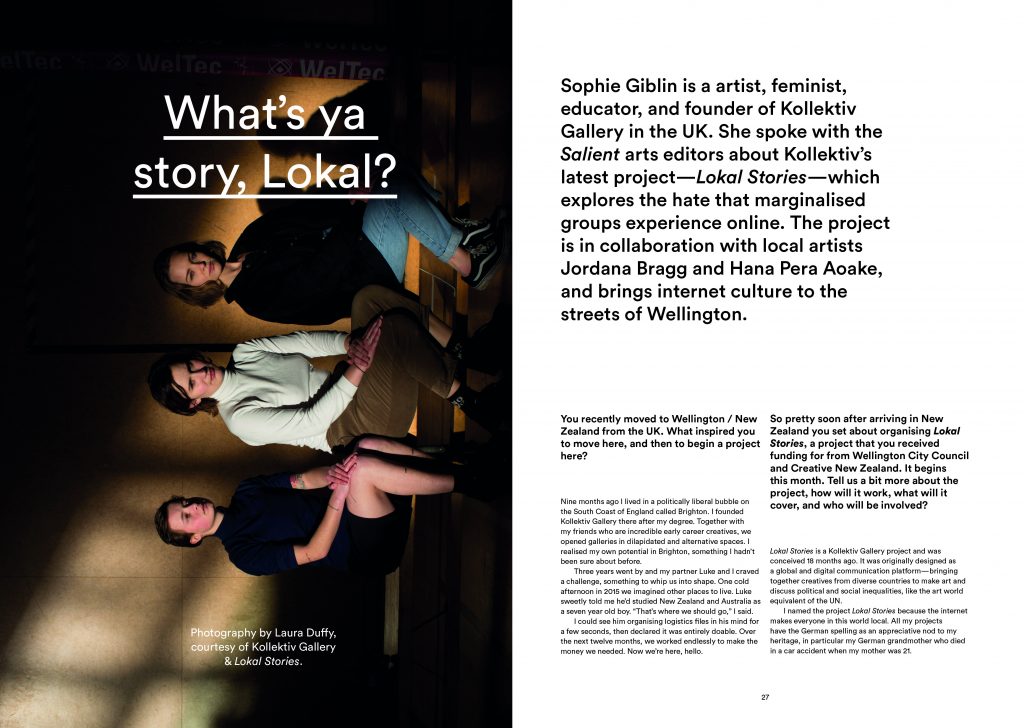
Thank you Salient for your constant support during our project.
